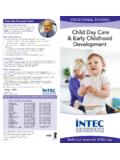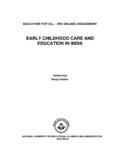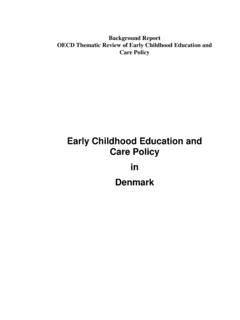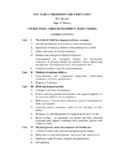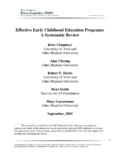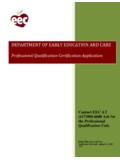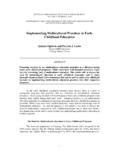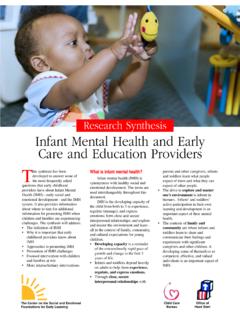Transcription of Early Childhood Care and Development - ECD Group
1 Early Childhood care and Development Definition Early Childhood care and Development (ECCD1) is a field of endeavour that focuses on supporting young children s Development . Early Childhood encompasses the period of human Development from prenatal through the transition from home or ECCD centre into the Early primary grades (prenatal 8 years of age). Based on research, ECCD links the young child s cognitive, social, emotional, and physical processes with the care (by families, communities, and the nation) required to support their Development . Framed by the UN Convention on the Rights of the Child,2 Discussion the ECCD field is interdisciplinary in its focus.
2 It includes health, nutrition, education, social science, economics, child protection, and social welfare. The ECCD field strives to ensure young children s overall well-being during the Early years, thereby providing the foundation for the Development of adults who are healthy, socially and environmentally responsible, intellectually competent, and economically productive. Children in the ECCD age Group experience the most rapid period of growth and change during the human lifespan. Their maturing minds and bodies and nervous systems support increasing mobility, communication skills, intellectual capacities, socioemotional Development , and cultural and personal identity.
3 These changes result in rapid shifts in the kinds of supports young children has highlighted the particular risks to young children from malnutrition, disease, poverty, neglect, social exclusion, violence, and lack of a socially stimulating environment. Research also indicates that well-designed promotion, prevention, and intervention strategies during Early Childhood have the potential to impact positively on young children s well-being and future prospects. 4 Discrimination against children based on ethnicity, gender, delays or disabilities, HIV and AIDS status, class/caste, personal circumstances and lifestyle, or political and religious Therefore, ECCD seeks to ensure convergent and coordinated quality services health, nutrition, sanitation, education, and protection within a safe and enriched environment.
4 1 ECCD is also known as Early Childhood Development (ECD) and encompasses Early Childhood education (ECE), Early Childhood care and education (ECCE), and other designations. 2 To understand young children s rights within the CRC, refer to General Comment 7, Implementing child rights in Early Childhood (Fortieth session, 2005), UN Doc. CRC/C/GC/7 (2006). 3 Evans, Judith, Robert Myers, and Ellen Ilfeld. 2000. Early Childhood counts. Washington: World Bank. 4 Grantham-McGregor, Sally, Yin Bun Cheung, Santiago Cueto, Paul Glewwe, Linda Richter, Barbara Strupp, and the International Child Development Steering Group .
5 2007. Developmental potential in the first five years for children in developing countries. The Lancet, 369, 60-70. beliefs (of children or their parents) excludes children from full participation in society and reduces survival rates and quality of life. All children are entitled to optimal levels of care , nutrition, nurturance, encouragement, and the Early Childhood continuum from conception to age 8, each of three main age periods offers differing risks and opportunities: In creating appropriate systems and strategies, it is important to recognise that young children s experiences and rates of growth and Development vary.
6 They are influenced by the child s individuality, as well as gender, living conditions, family organisation, care arrangements, and the health and education systems that serve the child. To support children in their varying Development , quality services are grounded in local strengths and cultural values, enhanced by a variety of proven approaches drawn from national and international research. Prenatal through age 3 This period is critical for ensuring survival and immediate growth and Development , as well as establishing a trajectory for future Development and growth. Research indicates that during the first three years the brain undergoes rapid and complex Development , characterised by key sensitive periods, along with declining plasticity after this period.
7 In addition, delays are increasingly difficult to reverse after age It has also been demonstrated that convergent and coordinated quality services during the period of rapid brain growth can prevent an increase in developmental delays and even reverse achieve optimal Development , infants and young children need nurturing by at least one consistent parent or caregiver; good health care ; six months of exclusive breastfeeding, if possible; balanced nutrition including essential micronutrients; Early exposure to language; opportunities for playful exploration and interaction with other children and adults; and a clean, safe environment.
8 A young child s well-being may be put at risk by adverse living conditions, neglect, insensitive or abusive treatment, and restricted opportunities for exploring and learning. Young children growing up in especially difficult circumstances, such as severe poverty, malnutrition, wars, and disease, require particular attention. Strategies must include effective involvement of parents, families, and/ or primary caregivers that emphasises the quality of the adult-child interaction. The preschool years: ages 3-6 In addition to the support suggested above, children aged 3 to 6 benefit from experiences and programs that provide increased opportunities for learning through play and exploration in groups.
9 Safe, welcoming programs can be provided within the home, through community-based activities, and within more formal preschools. To develop confident learners, Early Childhood programs should provide children with opportunities to interact with responsive adults; active learning methodologies; enriched curricula; and access to a variety of play, learning materials, and books. Such programs should be provided in the child s mother tongue or home language except when the setting includes a number of children whose home languages are 5 General Comment 7, Implementing child rights in Early Childhood (Fortieth session, 2005), UN Doc.
10 CRC/C/GC/7 (2006). Critical to the success of these programs is the strong involvement of parents and primary caregivers to help children build the skills needed to make effective transitions into varied environments and increasing activity with larger and more diverse groups of people. 6 Mustard, Fraser. 2007. Experience-based brain Development : Scientific underpinnings of the importance of Early child Development in a global world. In Mary Eming Young, ed., Early child Development from measurement to action: A priority for growth and equity, 35-63. Washington: World Bank. 7 S. Grantham-McGregor, et al., 2007.
